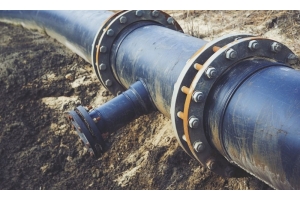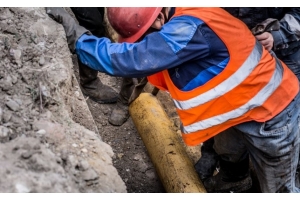Plugging Active Pipes in Extreme Environment


Some of the world's most intricate infrastructure is found in power plants, chemical plants, refineries, and other factories that use and combine industrial chemicals. The piping for fuel, chemical transport, water supply, and cooling needs is typically very complex and subject to high temperatures and pressures. And since plants are harsh environments, it's a given that piping needs regular maintenance, repair, and rerouting. But shutting down entire lines is often considered an impossibility: practical realities dictate that plants be kept running more or less continuously, and downtime is simply unacceptable. So, how can repairs to sections of pipes and lines be made without shutting down lines and keeping overall systems in operation?
"A great deal of what we do is in mills and chemical plants, and we have a lot of options in situations that call for a hot tap," explains Tom Bowling, P.E., Principal Engineer for Team Industrial Services, Inc., based in Alvin, Texas, "we can use a line stop, which to me means inserting a mechanical head into the line and stopping flow with a rubber cup. We can use a freeze stop in some cases. And bagging is a technique that solves a lot of customer problems."
'Bagging' is the insertion of a rubber bag into an active pipe, via a tapping saddle or other mechanism, and inflating the bag with a gas or liquid so that it unfurls and fills the line. This empties the downstream side of the plug so it can be worked on safely. Bowling has been using Inflatable Multi-Flex™ Pipe Plugs and the Hot Tap Pipe Plug Insertion System from Petersen Products since 1999, when he came across them at a conference on offshore technology. "The representative gave me a four-inch bag as a sample, which I still have, and two months later I had a call from Duke Power-they wanted to plug a 42-inch line located 12 feet under the basement of a nuclear power plant." And while he was preparing for that work, another call came in from a refinery in Southern Louisiana: two banks of exchangers were operating, but one was contaminated by leaking gas. To fix the leak and keep at least one exchanger bank working, Team Industrial would have to plug a 16-inch inlet under 180 psi, with temperatures up to 230ºF. So, two tricky jobs to take on with new techniques.
A new technique proves itself
Both projects went well according to Bowling. The Louisiana refinery was first, and he designed a helpful innovation; "We filled the bag with diesel in this case," he says, "that way, if there was a leak, there wouldn't be contamination." Filling the bag with diesel also kept the bag under pressure without being hooked to a compressor, and in the event the bag held up well. "We had a spare on hand just in case," says Bowling, "but the bag was in for the six months we needed and didn't fail." Plugging the nuclear power plant line also went smoothly, and the plug was kept in place for a week before being pulled.
Since then, Bowling estimates he's used Petersen Products bags 40-50 times, almost always custom fabricated. Factors that make bags the right choice include large pipe size, and he's used bags to plug lines up to 60-inches in diameter. Bags are also useful when lines are out of round or uneven internally due to scaling or buildup, because the rubber adheres to a larger area and adjusts to irregularities.
Petersen® Line Stop Plugs can be filled with gases or liquids as needed, and they've been used to stop water, chemicals, fuels, and a variety of hydrocarbon gases, especially low-pressure flare lines. In one case, Team Industrial inserted a bag into a large water pipe running 40 feet under an earthen dam, filled the bag with grout, then inserted another bag 150 feet from the first, filled it with grout, and filled the area in between with grout-this quickly and effectively sealed off a 660-foot pipe under 40 psi.
"We have been getting a very good response from our customers," says Bowling, "because this technique is just right for some applications and can keep the rest of a system running. We always work with the customer to figure out the best solution, and sometimes the bag can't be beat."
Angus W. Stocking, L.S.






